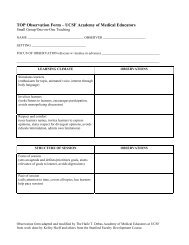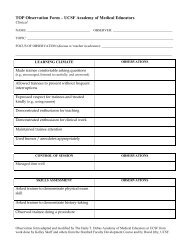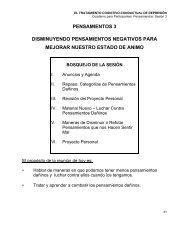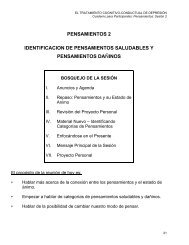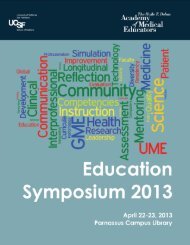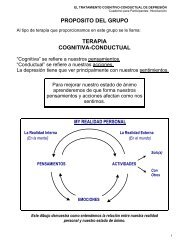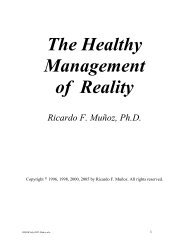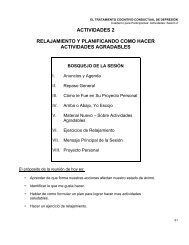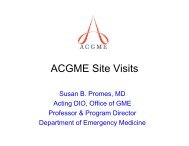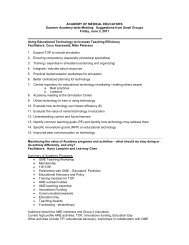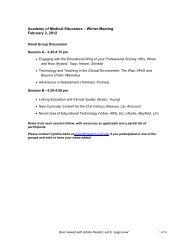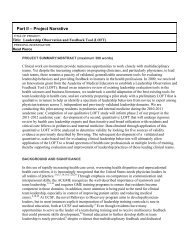2011 - UCSF School of Medicine - University of California, San ...
2011 - UCSF School of Medicine - University of California, San ...
2011 - UCSF School of Medicine - University of California, San ...
You also want an ePaper? Increase the reach of your titles
YUMPU automatically turns print PDFs into web optimized ePapers that Google loves.
<strong>UCSF</strong> Education Day <strong>2011</strong>Reflective critique: This curriculum was designed andevaluated with feedback from surgical faculty andmedical educators, and presented at ESCape. Feedbackfrom residents has prompted the design <strong>of</strong> a manual andtake-home videos, to be integrated into the curriculumnext year.Geriward: An Interpr<strong>of</strong>essional Team-Based Curriculum on Care <strong>of</strong> theHospitalized Older AdultStephanie Rennke, MD, <strong>UCSF</strong>,srennke@medicine.ucsf.edu; Lynda Mackin, RN, PhD,ANP-BC, CNS, <strong>University</strong> <strong>of</strong> <strong>California</strong>, <strong>San</strong> Francisco,lynda.mackin@ucsf.edu; Bree Johnston, MD, MPH,<strong>University</strong> <strong>of</strong> <strong>California</strong>, <strong>San</strong> Francisco, VA MedicalCenter; Adam Moylan, PhD, <strong>University</strong> <strong>of</strong> <strong>California</strong>, <strong>San</strong>Francisco, amoylan@ucsf.edu; Vicki Jue, PharmD,<strong>University</strong> <strong>of</strong> <strong>California</strong>, <strong>San</strong> Francisco,vicki.jue@ucsfmedctr.org; Cindy Lai, MD, <strong>University</strong> <strong>of</strong><strong>California</strong>, <strong>San</strong> Francisco, clai@medicine.ucsf.eduAreas abstract covers: UMEDomain(s) addressed: Competencies, Interpr<strong>of</strong>essionalEducation, Patient CarePurpose: To develop and implement aninterpr<strong>of</strong>essional team-based curriculum on care <strong>of</strong> thehospitalized older adult. Student objectives were to 1)identify geriatric competencies pertaining to the hospitalsetting; 2) engage in team-based learning to complete abedside exercise and 3) present a patient caseemphasizing systems-based practice.Background: Interpr<strong>of</strong>essional team care is required foreffective management <strong>of</strong> complex patients such as olderhospitalized adults. Health pr<strong>of</strong>essions students benefitfrom learning experiences that mirror current health caremodels. Team-based learning(TBL) is an effectivestrategy to teach students knowledge and skills inpatient care.Methods: GeriWard, <strong>of</strong>fered four times, included 26third year medical students, 12 fourth year pharmacystudents and 13 nursing students during 6 months <strong>of</strong> a12-month pilot. GeriWard included: (1) a two-hourworkshop, teams interviewed and examined an olderpatient focusing on one <strong>of</strong> three geriatric AAMCcompetencies: bladder catheters, restraints and skinassessment/pressure ulcer staging; and (2) medicalstudents presented their findings to the inpatient team.Students completed pre- and post-workshop surveys onattitudes towards interpr<strong>of</strong>essional education (IPE) andself-efficacy around the competencies. Hospital-basedfaculty rated the student presentations on content andapplication to systems-based practice.Results: Students showed improvement in attitudestoward IPE pre and post-curriculum (p= 0.001). Studentsrated self-efficacy on the competencies higher afterparticipating in the curriculum. Hospitalist faculty ratedthe student presentations highly, citing the students’ability to identify opportunities for quality improvementinterventions.Discussion: A curriculum combining team-basedlearning and bedside care increased students’ attitudestowards IPE and self-assessed ability to identify geriatriccompetencies and systems-based practice. Findings willbe presented at the Society <strong>of</strong> Hospital <strong>Medicine</strong>meeting and a manuscript will be developed forpublication.Reflective critique: Backed on feedback from studentsGeriWard will include physical therapy students andexpand to the SFVAMC and SFGH.Identifying Curricular Needs forClinical Medical Education inTanzaniaReena Gupta, MD, <strong>UCSF</strong>, reena.gupta@ucsf.edu; MollyFyfe, MPH MA, <strong>UCSF</strong>, mollyfyfe@yahoo.com; CharlesMkony, MD, Muhimbili <strong>University</strong> <strong>of</strong> Health and AlliedSciences, Tanzania, charles_mkony@yahoo.com; SarahMacFarlane, PhD MSc, <strong>UCSF</strong>,Macfarlane@globalhealth.ucsf.edu; Eligius Lyamuya,MD, Muhimbili <strong>University</strong> <strong>of</strong> Health and Allied Sciences,Tanzania, eligius_lyamuya@yahoo.com; Ephata Kaaya,MD, Muhimbili <strong>University</strong> <strong>of</strong> Health and Allied Sciences,Tanzania, ephata.kaaya@yahoo.comAreas abstract covers: UMEDomain(s) addressed: Clinical Instruction andPerformance, Competencies, Evaluation <strong>of</strong> Programsand Curricula, Global HealthPurpose: To identify curricular needs for clinicalteaching at the Muhimbili <strong>University</strong> <strong>of</strong> Health and AlliedSciences (MUHAS) <strong>School</strong> <strong>of</strong> <strong>Medicine</strong> in Tanzania.Background: Tanzania faces a severe shortage <strong>of</strong>physicians. High student-faculty ratios and limited clinicalteaching facilities challenge medical education atMUHAS. We examined clinical training at MUHAS toinform curricular revision and improve clinical teaching toensure the preparation <strong>of</strong> competent physiciangraduates.Methods: This situation analysis <strong>of</strong> clinical teaching atMUHAS draws on data from three sources. The 2009Tracer Study surveyed recent MUHAS medicalgraduates (n=147) and their supervisors (n=48) on theirperceptions <strong>of</strong> how well MUHAS prepared them for32 The Haile T. Debas Academy <strong>of</strong> Medical Educators



